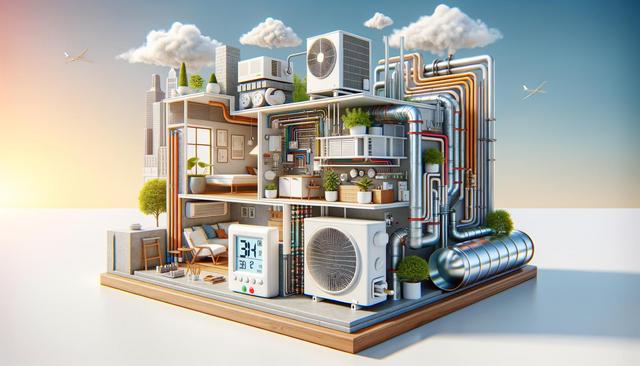What is HVAC and Why It Matters
HVAC stands for Heating, Ventilation, and Air Conditioning, and it refers to the systems used to regulate temperature, humidity, and air quality in buildings. These systems are essential for ensuring a comfortable indoor environment regardless of external weather conditions. Over the years, technological advancements have modernized HVAC systems, making them more energy-efficient, environmentally friendly, and easier to manage through smart controls. Properly functioning HVAC systems not only enhance comfort but also support productivity and health by maintaining optimal air quality and temperature.
Today, HVAC systems are a core component in both residential homes and commercial buildings, including offices, hospitals, schools, and manufacturing facilities. Their importance continues to grow as climate control becomes a key concern in energy efficiency and sustainable building practices. As a result, demand for reliable HVAC companies continues to rise, creating opportunities for both service providers and consumers seeking dependable climate control solutions.
How HVAC Systems Work
At the core of every HVAC system are three primary functions: heating, ventilation, and air conditioning. Understanding how each component works can help homeowners and business operators maintain their systems more effectively:
- Heating: Typically involves furnaces or heat pumps that generate warmth during colder months.
- Ventilation: Ensures the circulation of fresh air while removing contaminants, odors, and excess moisture.
- Air Conditioning: Cools indoor spaces by removing heat and regulating humidity levels.
These systems may operate independently or be integrated into a central system. Most modern HVAC systems are controlled by a central thermostat, often programmable or smart-enabled, allowing for energy-saving settings and remote access.
HVAC companies often offer a range of services to support these systems, including installation, maintenance, repairs, and upgrades. Regular maintenance is crucial to prolong system life, ensure efficiency, and prevent costly breakdowns.
Opportunities in the HVAC Job Market
With increasing demand for sustainable and efficient climate control solutions, the HVAC job market has seen steady growth. HVAC jobs span a variety of roles, from hands-on technical positions to design and project management. Individuals entering the field can pursue certifications or apprenticeships to gain the necessary skills. Key roles in the industry include:
- HVAC Technicians
- System Designers
- Installation Specialists
- Maintenance Engineers
- Energy Efficiency Consultants
Many HVAC companies actively seek skilled professionals to meet the growing needs of both residential and commercial clients. These jobs often offer competitive wages, career advancement, and job security, especially as climate control becomes increasingly important in energy conservation and health standards.
Choosing the Right HVAC Company
When selecting an HVAC company, it’s important to consider factors that ensure quality service and system reliability. A well-regarded company will typically offer the following:
- Clear service offerings and pricing
- Licensing and certified technicians
- Positive customer reviews
- Emergency services and warranties
- Experience with specific system types and brands
Whether you’re installing a new system, upgrading an outdated unit, or scheduling routine maintenance, working with professional HVAC companies ensures your investment is protected. Reputable providers assess your building’s specific needs and recommend appropriate solutions tailored to your budget and energy goals. This personalized approach fosters long-term efficiency and comfort.
The Future of HVAC Systems
The HVAC industry is evolving rapidly, driven by technological innovations, environmental regulations, and consumer demand for smarter, more efficient systems. Key trends shaping the future include:
- Integration with smart home ecosystems
- Use of eco-friendly refrigerants
- Energy-efficient heat pumps and solar HVAC options
- Remote diagnostic tools and predictive maintenance
As these innovations continue to develop, HVAC jobs are also evolving to require new skills, particularly in automation, data analytics, and energy efficiency. HVAC companies are increasingly investing in training and development programs to prepare their workforce for these changes. This transformation not only benefits the industry but also improves the overall user experience by delivering more responsive and sustainable climate control solutions.
Conclusion: A Growing Industry with Expanding Opportunities
The HVAC sector plays a fundamental role in modern infrastructure, providing essential services that support comfort, health, and energy efficiency. With ongoing advancements and a strong demand for skilled professionals, the field offers numerous opportunities for those considering HVAC jobs. For consumers, partnering with reliable HVAC companies ensures access to effective, long-lasting climate solutions. Whether you’re exploring a career path or seeking system upgrades, understanding the HVAC landscape empowers better decisions and long-term satisfaction.




Leave a Reply